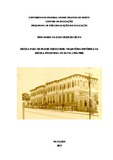Escola para os filhos dos outros: trajetória histórica da Escola Industrial de Natal (1942-1968)

Data
2012-04-12Autor
Silva, Nina Maria da Guia de Sousa
http://lattes.cnpq.br/0653806541583417
Metadado
Mostrar registro completoResumo
This paper presents a reconstruction of the historical trajectory of the Escola Industrial de Natal (Industrial School of Natal), in the period 1942 to 1968, based on the analysis of its cultural, social and pedagogical characteristics in a process in which its educational practices and the individuals who constructed them were getting involved in their actions. In this sense, the concepts of memory and school culture occupied a central place to understand the elements that characterized its administrative and pedagogical organization such as, for example, its curriculum, aims, disciplinary rules, clientele, teachers, leaders and the configuration of the institutional power. Designed to meet the demands of an industrial process that has strengthened in the country, throughout its history, the Escola Industrial de Natal was becoming a space predominantly occupied by individuals, from economically disadvantaged social groups in society, in search of a professional training that would guarantee them the exercise of a profession. The time frame from 1942 to 1968 allowed us to verify the changes caused by the Organic Law of Industrial Education of 1942, and the Law number 3.552, from 1959, in the organizational structure of this school. In this context, a characteristic that was evident was the purpose of making it flow between the students the love for the country, the respect for civic values and the belief that industrial education would be able to boost the country's development, an aspect that reached a bigger dimension from the 1950’s. Marked the disciplinary character of this institution the control over the actions of individuals, developed through its multiple educational practices in specific areas and in the predetermined time, under the constant gaze of those who participated, in some from, in driving this process. On the other hand, the vocational and human training, provided to students, allowed new opportunities for social integration, not only in the state of Rio Grande do Norte, but also in other regions of Brazil. Conversely, during his career, the Escola Industrial de Natal has remained being seen as an organized institution, with good teachers, but intended for the children of others.



